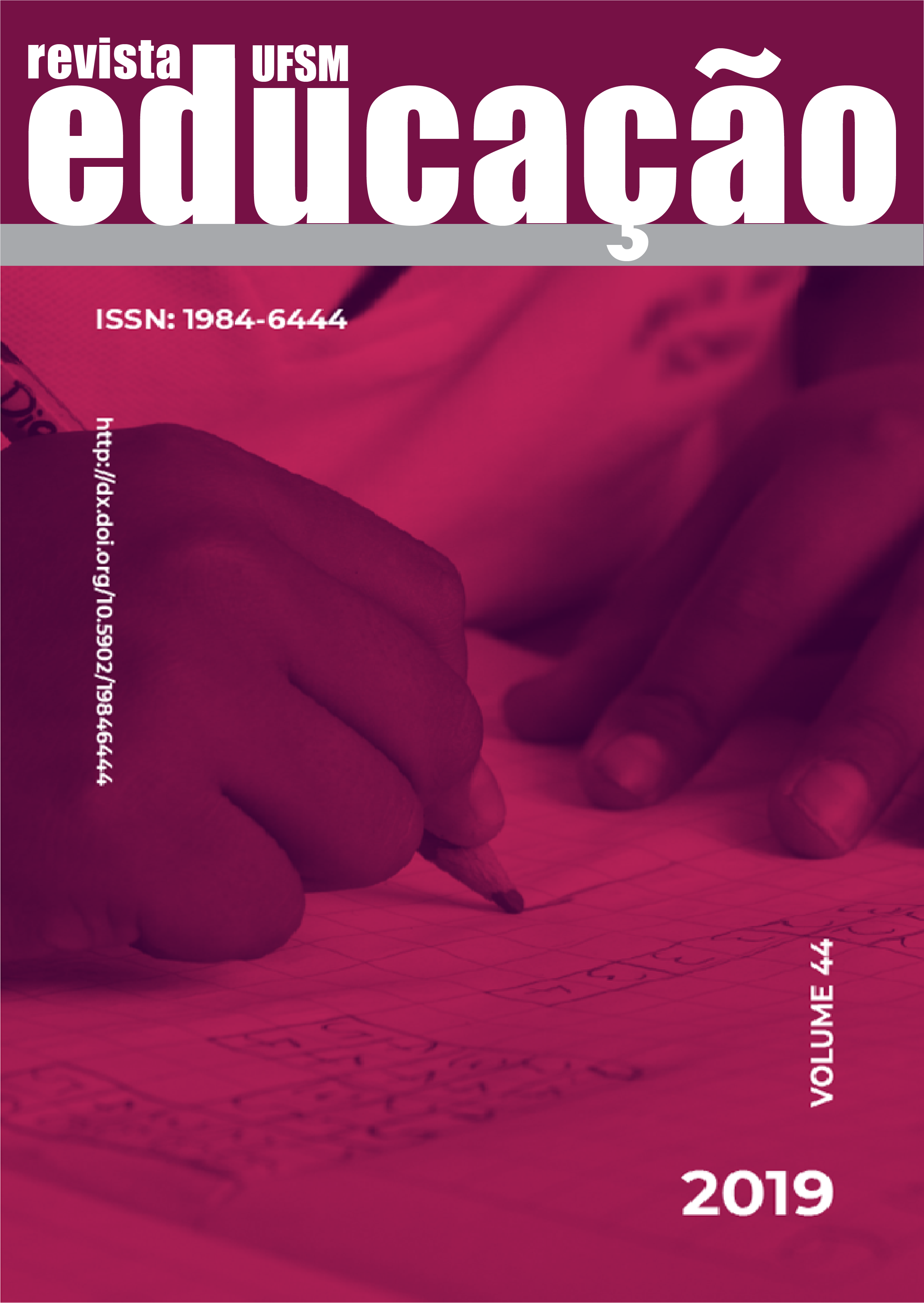Financial impacts of a policy of class-size reduction: the Portuguese case
DOI:
https://doi.org/10.5902/1984644432179Keywords:
Class-size reduction, Educational policies, Educational economy.Abstract
This research emerges in the follow up of a research project, funded by the Portuguese Ministry of Education, and which supported a new legal regulation regarding the size of classes. The present article aims to promote a reflection toward the benefits derived from the class-size reduction, looking, in this sense, to demonstrate that the costs resulting from this are usually overvalued when they are determined on the basis of a worker's gross cost to the State, and not taking into account the corresponding net costs. For this academic exercise it was taken into account the Portuguese case and the costs of a teacher for the public education system in Portugal at reference prices of 2017/2018. In addition to these net costs, it is necessary to consider other factors that justify the use of a policy of reduction of classes in Portugal. These are the positive pedagogical effects on students' learning - particularly in the most disadvantaged socioeconomic contexts -, the financial savings resulting from the amounts applied in programs to promote school retention, as well as a spillover effect in the medium to long-term resulting from a more educated population. This work intends to contribute to a better reflection on this subject, sensitizing different educational actors for a closer approximation to the relationship between cost and direct and indirect benefits that may result from a policy of class-size reduction.
References
BANCO DE PORTUGAL. Estatísticas do Banco de Portugal – Indicadores Económicos. Disponível em: https://www.bportugal.pt/indicadores?mlid=1042. Acesso em: 1 mar. 2018.
BARDIN, Laurence. Análise de conteúdo. Lisboa: Edições 70, 2009.
BECKER, Gary. Human Capital: A Theoretical and Empirical Analysis, with Special Reference to Education. Chicago: University of Chicago Press, 1964.
BLATCHFORD, Peter; CHAN, Kam; GALTON, Maurice; LAI, Kwok; LEE, Chi. Class Size Eastern and Western Perspectives. New York: Routledge, 2016.
BOGDAN, Robert; BIKLEN, Sari. Investigação qualitativa em educação – uma introdução à teoria e aos métodos. Porto: Porto Editora, 1994.
CAPUCHA, Luís; CABRITO, Belmiro; CARVALHO, Helena; SEBASTIÃO, João; MARTINS, Susana da Cruz; CAPUCHA, Ana Rita; ROLDÃO, Cristina; TAVARES, Inês; MUCHARREIRA, Pedro Ribeiro. A Dimensão das Turmas no Sistema Educativo Português. Lisboa: Ministério da Educação, 2017. Disponível em: https://www.portugal.gov.pt/pt/gc21/comunicacao/documento?i=a-dimensao-das-turmas-no-sistema-educativo-portugues. Acesso em: 29 dez. 2017.
CHINGOS, Matthew. The impact of a universal class-size reduction policy: Evidence from Florida’s statewide mandate. Economics of Education Review, n. 31, p. 543 – 562, 2012.
CONSELHO NACIONAL DE EDUCAÇÃO. Organização Escolar: As Turmas. Lisboa: Conselho Nacional de Educação, 2016.
DIÁRIO DA REPÚBLICA. Despacho Normativo n.º 13765/2004. Disponível em: https://dre.pt/web/guest/pesquisa/-/search/3118423/details/normal?q=13765%2F2004. Acesso em: 4 abr. 2018.
FINN, Jeremy; ACHILLES, Charles. Tennessee´s Class Size Study: Findings, Implications, Misconceptions. Educational Evaluation and Policy Analysis, v. 21, n. 2, p. 97-109, 1999.
HANUSHEK, Eric. Assessing the Effects of School Resources on Student Performance: An Update. Educational Evaluation and Policy Analysis Summer, v. 19, n. 2, p. 141-164, 1997.
HARFITT, Gary James. Class Size Reduction. Key Insights from Secondary School Classrooms. Singapore: Springer, 2015.
JEPSEN, Christopher; RIVKIN, Steven. Class size reduction and student achievement: The potential tradeoff between teacher quality and class size. Journal of Human Resources, v. 44, n. 1, p. 223 – 250, 2009.
KRUEGER, Alan. Economic considerations and class size. Economic Journal, n. 113, p. 34 – 63, 2003.
KRUEGER, Alan. Experimental estimates of education production functions. The Quarterly Journal of Economics, v. 114, n. 2, p. 497-532, 1999.
MINISTÉRIO DA EDUCAÇÃO. Estatísticas da DGEEC. Disponível em: http://www.dgeec.mec.pt/np4/home. Acesso em: 16 fev. 2018.
MUCHARREIRA, Pedro Ribeiro; ANTUNES, Marina Godinho. Os efeitos das variáveis macroeconómicas no desempenho das organizações: Evidência das pequenas e médias empresas em Portugal. Contabilidade & Gestão - Portuguese Journal of Accounting and Management – Revista Científica da Ordem dos Contabilistas Certificados, n. 17, p. 113-143, 2015.
NORMORE, Anthony; ILON, Lynn. Cost-Effective School Inputs Is Class Size Reduction the Best Educational Expenditure for Florida?. Educational Policy, v. 20, n. 2, p. 429-454, 2006.
PORDATA. Estatísticas de Portugal. Disponível em: https://www.pordata.pt/Portugal. Acesso em: 22 fev. 2018.
PSACHAROPOULOS, George; PATRINOS, Harry Anthony. Returns to Investment in Education: A Further Update. Education Economics, v. 12, n. 2, p. 111-134, 2004.
PSACHAROPOULOS, George. Returns to Investment in Education: A Global Update. World Development, v. 22, n. 9, p. 1325-1343, 1994.
SANT'OVAIA, Carlos; REIS, Rui Lopes. Retorno Fiscal do Investimento Público na Educação: caso do ensino secundário. Economia & Empresa, n. 8, p. 118-153, 2008.
SCHULTZ, Theodore. Investment in Human Capital. American Economic Review, v. 51, n. 1, p. 1-17, 1961.
SERVE. Financing class size reduction. Greensboro, NC: University of North Carolina School of Education, 2005.
WHITEHURST, Grover; CHINGOS, Matthew. Class Size: What Research Says and What it Means for State Policy. Washington D.C.: Brown Center on Education Policy, 2011.
Downloads
Published
How to Cite
Issue
Section
License
Declaration of originality
We declare that all articles present in the journal Educação (UFSM) are originals and were not submitted for publishing on any other publication, as a whole or a fraction. We also declare that, after being published by Educação (UFSM), a paper will not be submitted to another journal within two years. After this time, our journal transfers the publishing rights to the authors, with a permit granted by the Editorial Council.
We also acknowledge that the originals’ submission to Educação (UFSM) implies on a transference of copyright for physical and digital publishing to the journal. In case of noncompliance, the violator will receive sanctions and penalties predicted by the Brazilian Copyright Protection Law (n. 9610, dated 19/02/98).
Attribution 4.0 International (CC BY 4.0)
This license lets others remix, transform, and build upon the material for any purpose, even commercially, and copy and redistribute the material in any medium or format.

This work is licensed under a Creative Commons Attribution 4.0 International (CC BY 4.0)






